Abu-Rukun, Hassan (“Abu Adib”)
Son of Sa’ada and Salman. Born in 1901 in the Druze village of Isfiya on Mount Carmel. His father, an agriculturist, wanted to give him the occupation of the field, but the young man with literary and artistic tendencies was looking for other avenues for his full potential. The bloody events of 1929 brought him to work to promote peace between the various segments of the population in Israel and for this purpose he distributed a call to the leaders of the Druze and Muslim communities to do Jewish-Arab cooperation and devoted efforts to bring the Druze and Christian communities closer together. The Arab rioters, and even smuggled weapons from neighboring Arab countries for the Hagana organization, in addition to maintaining contact with the Druze leaders in Syria, and as a result secret contact was established between them and the representatives of the institutions of the Hebrew Yishuv in the country to ensure Druze neutrality in the Jewish-Arab struggle. Arab Supreme Court “headed by The Mufti Haj Amin al-Husseini, who even called Hassan, sought to dissuade him from his actions and warned against their continuation, but he ignored this and continued to work with the Jewish side, even though he was known for his activity in the Histadrut. , Horseback riding, and riding competitions in the north, and in May 1938 he was abducted from his home in Acre by the Mufti’s gangs and since then no trace has been found. According to information received by his sons, he was shot to death in the Galilee. He left a father, a wife, four sons and a daughter and four sisters. His name was immortalized in the number of fighters whose burial place is unknown, in the military cemetery in Isfiya. In July 1975, his family received the “Haganah”.
